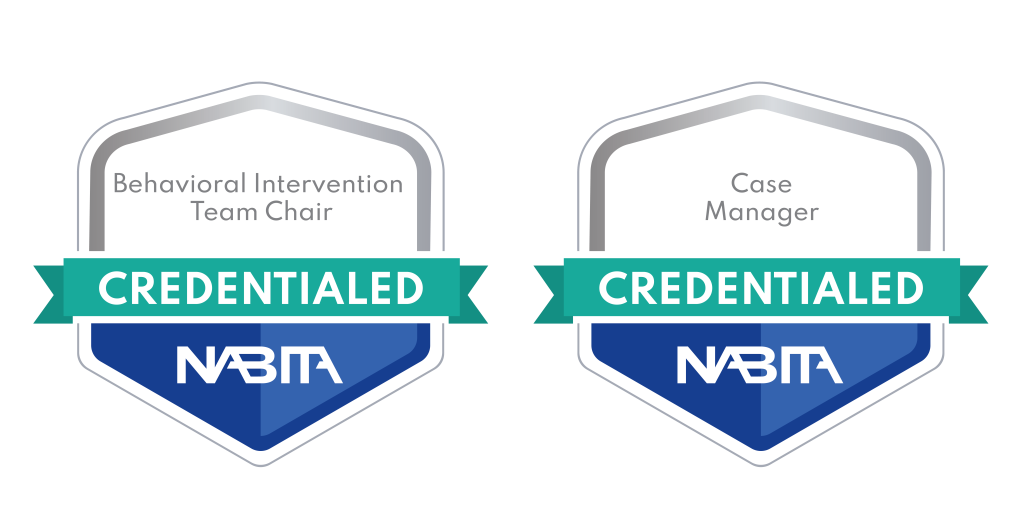Certified. Verified. Credentialed.
A NABITA Credential represents a new professional milestone, enhancing your credibility while validating proficiency in in essential behavioral intervention, case management, and threat and violence risk assessment competencies and safeguarding your campus or community. A NABITA Credential goes beyond certification to affirm your role-specific knowledge, skills, and decision-making through a robust competency-based evaluation process.
Information Session: Introducing NABITA Credentialing to Elevate Standards for Behavioral Intervention Professionals
As the landscape of behavioral intervention and threat assessment becomes increasingly complex, professionals deserve recognition of their advanced skills, nuanced judgment, and applied expertise in critical roles. In this public community event, we introduced NABITA Credentials, which recognize a practitioner’s expertise in role-specific decision-making, complex scenario handling, and ethical consistency.
An Advanced Competency Standard for Behavioral Intervention, Risk Assessment, and Case Management
NABITA has certified thousands of practitioners nationwide, and now, its Credentialing Program further elevates the field. This rigorous, competency-based pathway strengthens professional credibility and verifies the specialized proficiency required for effective behavioral intervention, threat assessment, and case management.
Think of it as validation of professional practice. It assesses not only what you know but also how effectively you apply that knowledge using sound judgment and a coordinated response.
In essence, NABITA Credentialing signals competence, deep expertise, sharp judgment, and advanced professional skills.
Why Pursue NABITA Credentialing?
Credentialing through NABITA offers a competitive advantage for professionals. This field-leading distinction signifies ongoing education, understanding of industry standards, and professional growth.



I’m Certified—Why Do I Need to be Credentialed?
Certification and credentialing enhance professional expertise and recognition, yet they differ in scope and purpose.
Certification reflects the successful completion of specialized training and confirms that attendees have engaged in structured learning on the theoretical knowledge and practical skills required for a role.
Verification recognizes those who have successfully passed post-tests tied to specific NABITA certification courses. Verification demonstrates comprehension beyond participation, showing that you have not only completed the training but also proven mastery of the material through an assessment.
Credentialing advances beyond certification and verification by validating mastery of the competencies required for a given role. Rather than simply confirming completion of training or a post-test, credentialing involves a dedicated, standalone assessment that demonstrates comprehension of those competencies at a professional level. Taken together, the related courses define the knowledge and skills a practitioner should possess, while the credentialing exam confirms an individual’s ability to apply them in alignment with industry standards.
Benefits of a NABITA Credential include:
Professional Recognition:
Credentialing verifies your expertise and ability to address emerging challenges in student support, wellness, violence prevention, and threat assessment, opening doors to career advancement. If you have earned or are working toward a NABITA Certification, the NABITA Credential is your next step. It’s an excellent way to reach the highest standard in the field, whether you are demonstrating excellence in your current role, seeking a promotion, or preparing for an executive position.
It validates your ability to navigate complex scenarios, make sound decisions, and apply specialized expertise that meets the highest industry standards. It reflects advanced professional growth and skill development.
Staying Current:
This demonstrates your commitment to ongoing learning by completing 60 maintenance hours over three years to maintain your NABITA Credentials.
Why Institutions Benefit:
NABITA Credentialing strengthens an institution’s confidence in its behavioral intervention, threat assessment, and case management practices by ensuring this work is carried out with verified proficiency. Practitioners who earn the Credential bring refined judgment, consistent practices, and defensible decision-making to their roles. This demonstrated competency reinforces the institution’s commitment to early intervention, safety, and community well-being. It also signals to students, employees, and families that their concerns are taken seriously and that the institution invests in the highest standards of professional excellence for teams responsible for prevention, assessment, and coordinated response.
Career Specialization:
Position yourself as a credentialed practitioner.

Start Your NABITA Credentialing Journey
No matter your experience level, NABITA Credentials showcase your expertise and dedication to behavioral intervention and threat assessment. New to NABITA? Complete a certification course and start working toward the credentialing exam. Already certified? Take the next step in your professional journey and prepare to earn your credential when credentialing launches in 2026. Invest in your professional growth—explore how NABITA credentialing can elevate your career.
- Behavioral Intervention Team Chair Credential Path
- This path consists of 7 training and certification courses
- Case Manager Credential Path
- This path consists of 4 training and certification courses
Frequently Asked Questions
Certification confirms that you have completed structured training covering the knowledge and skills needed for a role. Verification goes a step further by requiring a post-test tied to the training. Passing it demonstrates not just participation but proven understanding of the material. Credentialing is the highest level of NABITA recognition for individuals, as it validates professional-level mastery of role-specific competencies through a standalone exam. While certification and verification show training completion and comprehension, credentialing confirms the ability to apply knowledge and skills in alignment with industry standards.
Certification is often the first step—it shows completion of training. Credentialing elevates your expertise by validating your skills through a dedicated, standalone exam that is specifically designed to assess advanced practitioner-level competencies. It enhances your professional credibility, strengthens your career prospects, and is increasingly recognized as a preferred qualification in the field.
Available credentials include:
- Behavioral Intervention Team Chair Credential Path (NABITA-CC)
- Case Manager Credential Path (NABITA-CM):
The exam is competency-based and scenario-driven. It goes beyond multiple-choice knowledge checks by assessing your ability to apply behavioral intervention and threat assessment knowledge in practice. While post-tests from courses contribute to the question bank, the credentialing exam is more advanced and role-focused, and it is open-book, allowing you to reference course or other relevant materials as you demonstrate proficiency and competence.
That is the recommended path, but there are two credentialing paths available:
- Course-Based Path (Recommended): Most participants complete the required NABITA courses specific to the credential they wish to obtain and post-tests before sitting for the credentialing exam. This is the most structured and supportive path, designed to maximize your preparation and chances of passage the first time
- Test-Out Path: Experienced professionals with significant prior training may apply to sit directly for the credentialing exam without taking NABITA courses. However, this path requires a higher passing score (90%) and comes with a stand-alone exam fee. It is intentionally rigorous and best suited for seasoned practitioners.
The required passing score depends on your credentialing path:
- Course-Based Path: Candidates who complete NABITA courses and post-tests must achieve a minimum score of 85% on the credentialing exam.
- Test-Out Path: Candidates who bypass courses and sit directly for the exam must achieve a higher threshold of 90%, reflecting the additional rigor of this pathway.
Candidates can retake the exam, but fees apply after two attempts. In some cases, individuals who fail more than twice may be required to complete courses before becoming eligible to retry.
- Behavioral Intervention Team Chair Credential Path (NABITA-CC) exam:
- $1,750 member fee; $2,500 non-member fee
- Case Manager Credential Path (NABITA-CM) exam:
- $1,000 member fee; $1,750 non-member fee
Exam fees do not include the cost of individual training and certification courses or workshops. Contact us today to discuss fees for the Test-Out Path.
Credential holders must complete 60 hours of ongoing professional development with NABITA every three years. Maintenance credits may include NABITA in-person events, webinars, certification courses, or other approved activities.



